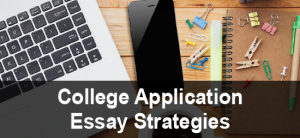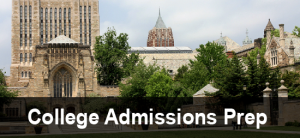Ever wonder what your Yale alumni interviewers say about you in their reports?
Well, today’s your lucky day.
I’m sharing excerpts from Yale alumni interview reports, but this article is also designed to help you prepare for your alumni interviews with other colleges.
Yale published these reports to help their volunteers understand “the kinds of commentaries that help the admissions committee make careful, informed decisions.” (Just FYI, interviews with Yale are evaluative.)
I’m featuring key passages from these reports and providing commentary on them to empower and inspire you.
Not knowing what’s going to happen and not having a sense of how your conversation fits into a college’s evaluation of you are two reasons why alumni interviews are really stressful. This behind-the-scenes information will help alleviate some of your anxiety.
Learn more about preparing for your alumni interviews. . .
Click here to read “The Worst Alumni Interview Question & How to Answer It.”
Click here to access “Preparing for Your Alumni Interview.”
Click here to get a “Sneak Peek at Dartmouth Alumni Interviews.”
Most of you are never going to see your alumni interviewer reports or your teacher recommendations because you waived your FERPA rights, but you can get a glimpse into the impressions other students have made on interviewers and understand how those impressions were created.
The point isn’t to copy other students or conform to a particular way of being.
Rather, it’s to experiment with thinking about yourself through the lens of others.
- How can you share with interviewers authentic anecdotes about yourself?
- What kinds of things do alumni interviewers pick up on?
- What types of follow-up questions might they ask?
- What are they observing about you as you talk about yourself?
Looking at actual examples of alumni interviewer reports can help you start answering these questions.
RIGHT AND WRONG WAYS OF ANSWERING THE “WHY US?”
ALUMNI INTERVIEW QUESTION
Let’s plunge right in.
2 ALUMNI INTERVIEW REPORTS
Read the summarized details that the alumni interviewers shared for Ruth and Jerod even if you think they have no connection to you.
The report for Ruth provides insight into effective ways of helping alumni interviewers understand why you feel this particular school is a good fit for you.
- The interviewer writes about Ruth’s interest in conducting research in Yale’s Beinecke Rare Book and Manuscript Library and how she’s drawn to the Peabody Museum due to her intellectual interest in evolution and mammals.
- Details about Ruth’s longstanding connection with nature, concern “about the rate at which nature is disappearing,” and intention to “do something about it as a scientist (vs. an attorney or politician)” are also included.
- The interviewer reveals that Ruth has an even more specific interest in this field (“animal behavior and related research”) and remarks on how she’s “read much in psychology textbooks,” which “led to a discussion about the work of Temple Grandin and also the life of Nim Chimpsky.”
The report on Jerod is a great example of a terrible way to demonstrate your fit for a school like Yale.
- The interviewer begins by pointing out that Jerod “described his academic interests as marketing and public relations” and was “surprised that Yale does not have a major in those subjects.”
Yikes!
- Whenever the interviewer “started talking about academics,” Jerod “shifted the conversation to his ideas about the future” and talked about his interest in creating the “`perfect’ product.” Unfortunately, when “pressed. . .to say what that product might be and what motivated him to think along those lines,” he didn’t provide any compelling responses.
MY COMMENTARY ON THESE ALUMNI INTERVIEWS
Now let’s break things down and consider what went right and what went wrong.
It’s evident from the report that Ruth came prepared to talk about her intellectual interests and how specific resources at Yale will help her more fully develop them.
She’s also able to describe how she’s taken action on her interest in animal behavior and is capable of engaging in discussion about her knowledge. The alumni interviewer’s wording suggests that there was a back-and-forth exchange. It wasn’t just that the interviewer asked one question and the student shared a long answer. Also, notice that Ruth doesn’t just say that she is interested in nature. There is a particular problem in nature that matters to her and she has a sense of what main avenue she wants to take to in order to ameliorate it.
Jerod was clearly unprepared for his Yale interview.
He didn’t even realize that Yale doesn’t offer pre-professional degrees. That’s bad.
But there are some other things that you might not have picked up on in the report. Jerod doesn’t seem capable of engaging in an in-depth discussion of his interests in marketing and the “perfect product.” He just has a sound bite that doesn’t stand up to questioning.
As the interviewer notes, he also seemed to want to jump past his undergraduate experience to focus on the future. This is a BIG and common mistake.
Colleges are trying to figure out whether or not to admit you to their undergraduate program, so they’re curious about what you want to study and explore during the next four years.
BOTTOM LINE ON PREPARING FOR YOUR ALUMNI INTERVIEWS
Make sure that you are prepared to share with alumni interviewers why you are interested in studying at their alma mater.
Read “How to Write Great Supplemental Essays” to get more tips on how to discuss your academic interests in relation to specific colleges.
Bonus tips: Don’t try to flatter schools. They know they’re great and don’t need you to tell them so. In fact, this kind of superficiality will backfire. For example, Jerod’s interviewer points out that he seemed “attracted more by Yale’s prestige than by the actual academic programs and overall experience.”
Also, avoid saying or implying negative things about other schools.
WHAT HAPPENS IF YOU CAN’T ELABORATE ON YOUR THINKING?
3 ALUMNI INTERVIEW REPORTS
Let’s take a look at the reports on Hans,Theresa and Trevor.
We’re told that the report on Hans “offers the kind of insight that helps the admissions committee distinguish among candidates with similar academic credentials but different levels of intellectual maturity.”
- The interviewer notes that “the biggest challenge. . .was to encourage Hans to elaborate on his thinking”; he “sees no need to explain because everything is quickly clear in his own mind.”
- We also learn that Hans “seems to prefer the abstract to the tangible.” The interviewer “was pushing towards the tangible in an effort to understand how he thinks” and concludes that he “will develop the ability to elaborate and give more complete explanations, but he’s not there yet.”
Yale points out that Theresa’s report is being shared because it’s an example of a “common assessment for a large number of our applicants who are perfectly admissible, but are unlikely to stand out in the pool.”
- The interviewer notes: “I asked her why she wanted to be a doctor, and I first got her `funny’ answer: `I’m good at science, and I’m Asian, after all…’ I then got the real answer: she enjoys science and math as disciplines and her mother was a nurse in their former country, and she has a very positive view of helping people for a profession.”
Trevor’s report sheds light on how he helped the interviewer understand his intellectual interests and their evolution.
- The interviewer remarks that Trevor’s interest in International Studies is “well thought out” and comments on how he has “followed this interest with action in the past several years.” During their conversation, Trevor explained how his interest shifted from science to politics and “rattled off the names of several books he’s read in the past year on Middle East politics.”
- The interviewer admits to having “poked/prodded/tested him on the subject” and observes that he “was very knowledgeable and insightful in his commentary.”
- He also adds that Trevor shared a “copy of his school’s Journal of Political Science and Economic Analysis,” which featured two of his articles.
MY COMMENTARY ON THESE ALUMNI INTERVIEWS
I wanted to share the examples of Hans and Theresa because many students have the grades, test scores, and extracurricular activities that “fit” the general standards associated with their schools, but they lack the intellectual maturity that’s essential to getting closer to the “admitted” category.
What does it mean to be intellectually mature?
In this context, an intellectually mature student is someone who has the ability to reflect on his or her interests, experiences, and goals and can express these reflections in conversation and in writing. Notice that Hans’ interviewer wanted to “understand how he thinks” and that Theresa’s interviewer wanted to know why she’s interested in medicine. Hans can’t yet seem to explain, and Theresa only offers a superficial response.
Trevor’s report offers us insight into one way you can demonstrate your intellectual maturity. He talks about what sparked his interest in International Studies and has clearly taken action outside of the classroom through independent reading. Trevor’s not just a passive consumer of information; he’s written articles and published them in one of his school’s journals. His interests stand up under the interviewer’s questioning, which reveals his ability to engage in on-the-spot discussions.
BOTTOM LINE ON PREPARING FOR YOUR ALUMNI INTERVIEWS
Make sure that you are prepared to talk about your intellectual interests, how you got interested in these issues, why you are drawn to them, and how you’ve taken action on them.
You’re not just helping alumni interviewers understand the subjects themselves and why you are interested in them.
You’re showing them how you think—your process of thinking, discovering, and analyzing.
It is absolutely okay if you haven’t settled on a major yet, but you do need to be able to talk about some of the subjects, issues, and questions that intrigue you.
It’s perfectly acceptable to talk about your next steps or projects.
I even encourage you to ask your interviewer about her intellectual experience in college. How did his or her academic interests change or deepen at the school?
NEXT STEPS
You can watch a shorter version of what I’ve written about in this post.
GET DR. BERNSTEIN’S HELP PREPARING FOR YOUR INTERVIEW & MORE
Click here to learn how to schedule a private consultation.
Click here to learn more about Dr. Bernstein’s ongoing private college preparation and college admissions support.
Click here to learn about the online Get Yourself Into College® program.
Blog post image used: ©mkabakov/bigstock.com



